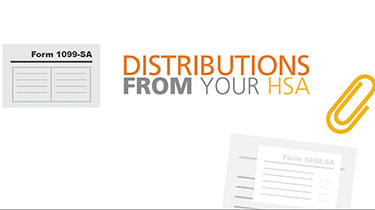Get answers to your tax questions
Q. What is the HSA contribution deadline?
A. You have until the tax filing deadline (typically April 15) to make contributions to your HSA for the previous year. If your due date falls on a Saturday, Sunday, or legal holiday, the due date is moved to the next business day.
Q. How do I obtain a copy of my tax forms?
A. You can get copies of your most recent tax forms by signing in to your account online and viewing the "Statements and Tax Docs" section.
Q. How do I save on taxes with an HSA?
A. The money you contribute to your HSA is tax-deductible up to the annual contribution limit. For example, if you are in the 28 percent tax bracket and deposit $3,000 into your HSA, you could save $840 in federal income taxes. Money you take out of your HSA to pay for qualified medical expenses is tax-free. Interest you may earn on your HSA grows income tax free.
Q. Which forms do I need to file my taxes?
A. There are three tax forms associated with health savings accounts (HSAs): IRS Form 1099-SA, 5498-SA and IRS Form 8889.
Please use the information in your 1099-SA form, available online, to fill out IRS tax form 8889. Form 8889 is the only one you need to submit with your taxes. You can find IRS tax form 8889 in the “Statements & Docs” section after signing in to your account.
- IRS form 1099-SA shows the amount of money you spent from your HSA during the tax year.
- IRS form 5498-SA shows the amount of money deposited into your HSA for the tax year.
- IRS form 8889 is the form you fill out and submit with your tax return.
Q. When will I get my tax forms?
A. IRS Form 1099-SA is typically available at the end of January. It will be posted to your account and mailed, if elected. IRS Form 8889 can be downloaded from IRS.gov at any time.
IRS Form 5498-SA is typically available around the end of January. If you contribute in the new year for the previous tax year, you will also get another 5498-SA form in May.
Q. Why doesn’t my W-2 match the Form 5498-SA?
A. If the contributions on your W-2 don’t match your Form 5498-SA, you likely made after-tax contributions or contributions between January 1 and tax day for the previous tax year.
Q. What do I need to report to the IRS?
A. In addition to the forms noted above, keep track of your spending in case you have to prove you used funds for qualified medical expenses. It’s up to you to keep track of your expenses and report any funds you use for nonqualified medical expenses.
Q. What about nonqualified expenses?
A: It’s up to you to maintain records to verify that funds were used for qualified medical expenses. Funds used for nonqualified expenses will be taxed as income and subject to a 20 percent penalty. If you mistakenly use your HSA for a nonqualified expense, you can return the funds to your HSA to avoid the penalty. Sign in to your account and download the Withdrawal Correction Form. Optum Bank® must receive it by the tax filing deadline.
If you are 65 or older or enrolled in Medicare, you can use your HSA for nonmedical expenses without incurring a tax penalty. Those distributions will be treated like retirement income and will be subject to normal income tax.
Q. What happens if I contribute too much?
A. If you contribute more than the allowable amount, you will have to count the extra amount as taxable income, and the IRS may have you pay a 6 percent excise tax on the excess contributions. This tax applies to each tax year the excess contribution remains in the account.
If you do make excess contributions, you can prevent being penalized by completing an Excess Contribution and Deposit Correction Request Form to have excess funds returned to you. This and other account forms are available after you sign in.
Q. Where can I find my state tax information?
A. Each state can decide to follow the federal tax guidelines for HSAs or establish its own. Please consult a tax advisor regarding your state’s rules or visit your state’s Department of Revenue office for more information.
While health savings accounts (HSAs) were created by the federal government, states can choose to follow the federal tax treatment guidelines or establish their own.
Eligible HSA contributions are not taxed by these states:
- Alabama
- Arizona
- Arkansas
- Colorado
- Connecticut
- Delaware
- Georgia
- Hawaii
- Idaho
- Illinois
- Indiana
- Iowa
- Kansas
- Kentucky
- Louisiana
- Maine
- Maryland
- Massachusetts
- Michigan
- Minnesota
- Mississippi
- Missouri
- Montana
- Nebraska
- New Mexico
- New York
- North Carolina
- North Dakota
- Ohio
- Oklahoma
- Oregon
- Pennsylvania
- Rhode Island
- South Carolina
- Utah
- Virginia
- Vermont
- West Virginia
- Wisconsin
Eligible HSA contributions are taxed by these states:
Consult your financial advisor or state department of revenue for more information.
- California
- New Jersey
States without state income taxes – eligible HSA contributions are not taxed:
- Alaska
- Florida
- New Hampshire
- Nevada
- South Dakota
- Tennessee
- Texas
- Washington
- Wyoming
HSA earnings (but not eligible contributions) are taxed by these states:
Consult your financial advisor or state department of revenue for more information
- New Hampshire
- Tennessee



